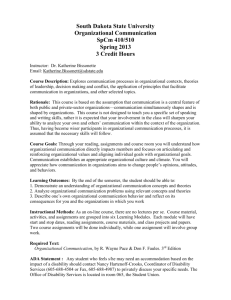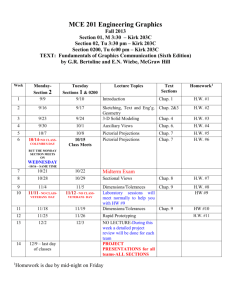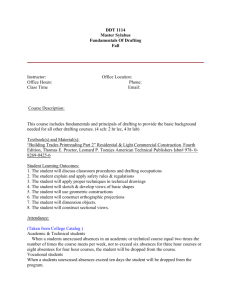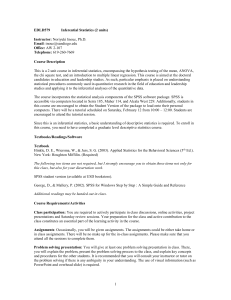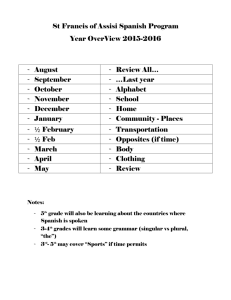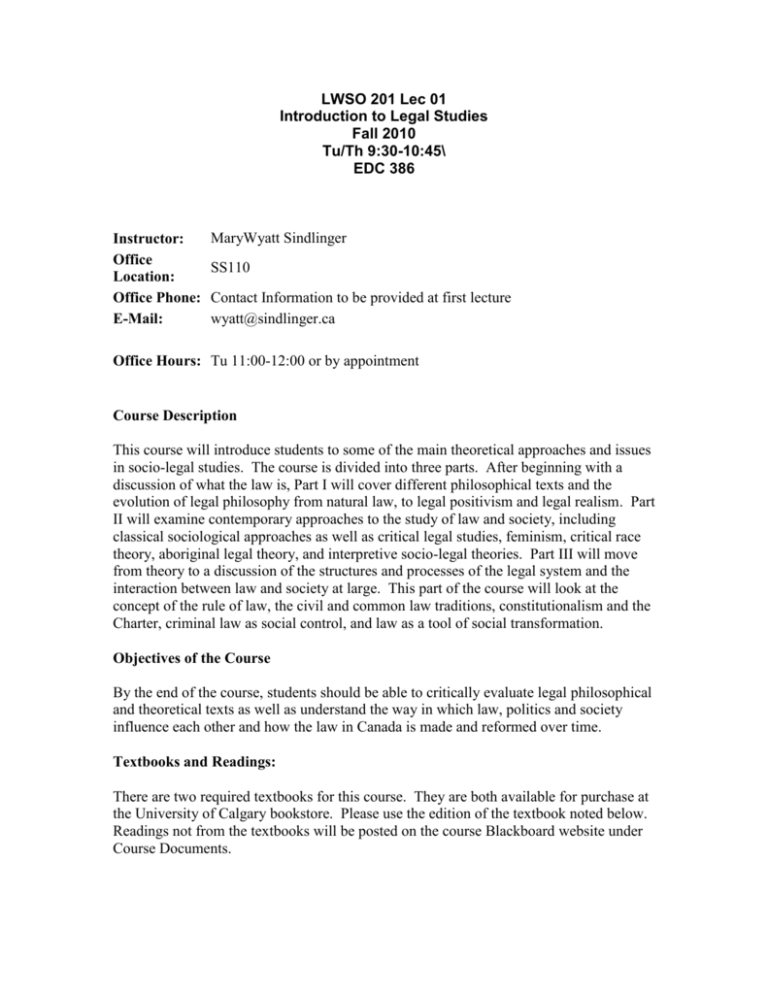
LWSO 201 Lec 01
Introduction to Legal Studies
Fall 2010
Tu/Th 9:30-10:45\
EDC 386
Instructor:
Office
Location:
Office Phone:
E-Mail:
MaryWyatt Sindlinger
SS110
Contact Information to be provided at first lecture
wyatt@sindlinger.ca
Office Hours: Tu 11:00-12:00 or by appointment
Course Description
This course will introduce students to some of the main theoretical approaches and issues
in socio-legal studies. The course is divided into three parts. After beginning with a
discussion of what the law is, Part I will cover different philosophical texts and the
evolution of legal philosophy from natural law, to legal positivism and legal realism. Part
II will examine contemporary approaches to the study of law and society, including
classical sociological approaches as well as critical legal studies, feminism, critical race
theory, aboriginal legal theory, and interpretive socio-legal theories. Part III will move
from theory to a discussion of the structures and processes of the legal system and the
interaction between law and society at large. This part of the course will look at the
concept of the rule of law, the civil and common law traditions, constitutionalism and the
Charter, criminal law as social control, and law as a tool of social transformation.
Objectives of the Course
By the end of the course, students should be able to critically evaluate legal philosophical
and theoretical texts as well as understand the way in which law, politics and society
influence each other and how the law in Canada is made and reformed over time.
Textbooks and Readings:
There are two required textbooks for this course. They are both available for purchase at
the University of Calgary bookstore. Please use the edition of the textbook noted below.
Readings not from the textbooks will be posted on the course Blackboard website under
Course Documents.
Steven Vago and Adie Nelson, Law and Society (Third Canadian Edition) (Toronto:
Pearson Prentice Hall, 2010) – the Second Edition 2008 is also acceptable.
Logan Atkinson et al. (Carleton Department of Law casebook Group), Introduction to
Legal Studies, 4th ed. (Captus Press, 2010). Please do not use the 3d ed., 2001.
Assignments and Evaluation
Assignment: 20%
Handed out September 30, 2010
Due October 14, 2010
The assignment will be three short answer questions (2-3 paragraphs per answer)
covering material in Part I of the course.
Assignment: 40%
Due December 9, 2010
The assignment is an essay of 8-10 pages in length addressing an issue in socio-legal
theory which draws on the various legal theories presented in the course. Handed out in
the second week of term so that you can begin considering what issue you might address.
Final Exam: Registrar Scheduled exam 40%
The final exam will consist of short answer and long answer, essay style questions. The
final exam will be cumulative (i.e. will cover all 13 weeks of the course) and will test
students on the lectures and the readings. The exam will be closed book.
You must pass both assignments and the final exam in order to pass the course. A
failure on any of the individual components will result in a failing grade for the
course.
It is the student's responsibility to keep a copy of each submitted assignment.
Note: Please hand in your essays directly to your tutor or instructor if possible. If it is not
possible to do so, a daytime drop box is available in SS110; a date stamp is provided for
your use. A night drop box is also available for after-hours submission. Assignments will
be removed the following morning, stamped with the previous day's date, and placed in
the instructor's mailbox.
Registrar-scheduled Final Examination: Yes
Please note: If your class is held in the evening, the Registrar's Office will make every
attempt to schedule the final exam during the evening; however, there is NO guarantee
that the exam will NOT be scheduled during the day.
Policy for Late Assignments
Assignments submitted after the deadline may be penalized with the loss of a grade (e.g.:
A- to B+) for each day late.
Freedom of Information and Protection of Privacy Act
This course is conducted in accordance with the Freedom of Information and Protection
of Privacy Act (FOIP). As one consequence, students should identify themselves on all
written work by using their ID number. Also you will be required to provide a piece
of picture identification in order to pick up an assignment or look at a final exam.
For more information see also http://www.ucalgary.ca/secretariat/privacy.
Grading System
The following grading system is used:
A+
A
AB+
B
BC+
C
CD+
D
F
Grading Scale
96-100
90-95.99
85-89.99
80-84.99
75-79.99
70-74.99
65-69.99
60-64.99
55-59.99
53-54.99
50-52.99
0-49
Schedule of Lectures and Readings
The following topics and readings will be covered, time permitting. All references to
Atkinson are to the 4th ed.; all references to Vago are the 3rd ed. Readings not in the
texts will be posted to Blackboard.
Part I – Legal Theory and Philosophy
Week 1: What is Law and Natural Law
Sept 14 and 16
Atkinson, chap 1 and 2
Vago, chap 1
Plato, Crito
Aristotle, selections from The Nicomachean Ethics
Week 2: Natural Law and Legal Positivism
Sept 21 and 23
St. Thomas Aquinas, Summa Theologiae, Q. 90, 94 and 95
Thomas Hobbes, Leviathan, Part 1 Chap 13, 15, Part 11 Chap 17.
Edmind Burke, selections from Reflections
Week 3: Legal Positivism and Legal Realism
Sept 28 and 30
The first assignment will be handed out September 30th
Atkinson, chap 5 and 6
Other readings to be posted
Part II- Law and Social Theory
Week 4: Foundations of Socio-legal Theory
October 5 and 7
Atkinson, chap 5
Vago, chap 2
Week 5: Marx and Critical Legal Theory
October 12 and 14
First Assignment due Oct 14 by 4:30 pm.
Atkinson, chap 14
Atkinson, chap 6(f) Toward a Political Economy of Law, only
Additional readings to be posted
Week 6: Feminism and Race-based Critical Theory
Oct 19 and 21
Atkinson, chap 6 the remainder
Week 7: Aboriginal Legal Theories and Interpretive Theory
October 26 and 28
Atkinson, chap 11(f) Aboriginal Peoples and The CCRF only
R. v. Delgamuukw (excerpts)
R v. Sparrow
Additional readings re: Interpretive theory to be posted
Part III – Structures and Processes
Week 8: The Rule of Law and the Common and Civil Law Traditions
November 2 and 4
Atkinson, chap 3
Vago, chap 1
Week 9: The Canadian Constitution and Social Change
November 9
No classes Nov 11
Atkinson, chap 3
Vago, chap 4, pp. 118 – 126 only
Relevant case law to be posted
Week 10: The Charter of Rights and Freedoms
November 16 and 18
Relevant cases to be posted
Atkinson, chap 11
Week 11: The Role of Judges
November 23 and 25
Atkinson, chap 24
Vago, chap 4 pp. 126-145
Week 12: Crime and Punishment as Social Control
November 30 and Dec 2
Atkinson, chap 12 and 13
Vago, chap 5
Week 13: Law and Social Change
December 7 and 9 – last day of classes
Second Assignment due December 9 by 4:30pm.
Atkinson, chap 26 and 27
Vago, chap 7
Plagiarism
Using any source whatsoever without clearly documenting it is a serious academic
offense. Consequences include failure on the assignment, failure in the course and
possibly suspension or expulsion from the university.
You must document not only direct quotations but also paraphrases and ideas where they
appear in your text. A reference list at the end is insufficient by itself. Readers must be
able to tell exactly where your words and ideas end and other people’s words and ideas
begin. This includes assignments submitted in non-traditional formats such as Web pages
or visual media, and material taken from such sources.
Please consult your instructor if you have any questions regarding how to document
sources.
Internet and Electronic Device Information
Laptop computers are permitted in class. All other electronic and communication devises
including but not limited to IPods, MP3s, cell phones, blackberries, or any audio or visual
recording devices are prohibited except with the express written permission of the
instructor.
Academic Misconduct
For information on academic misconduct and the consequences thereof please see the
current University of Calgary Calendar at the following link;
http://www.ucalgary.ca/pubs/calendar/current/k.html
Academic Accommodation Policy
If you are a student with a disability who may require academic accommodation, it is
your responsibility to register with the Disability Resource Centre (220-8237) and discuss
your needs with your instructor no later than fourteen (14) days after the start of the
course. For further information, please see http://www.ucalgary.ca/drc/node/46
Emergency Evacuation and Assembly points
Please note the evacuation points for this particular classroom. All classrooms on campus
exit to specific places in case of emergency. The emergency assembly points differ
depending upon where your classroom is located. For information on the emergency
evacuation procedures and the assembly points see
http://www.ucalgary.ca/emergencyplan/assemblypoints
"SAFEWALK" Program
Campus Security will escort individuals day or night -- call 220-5333 for assistance. Use
any campus phone, emergency phone or the yellow phone located at most parking lot
booths.
Student Representation
Another source of information that you may wish to use is your student representative.
All faculties elect students to represent them on the Students Union. Please see
http://www.su.ucalgary.ca/home/contact.html
For your student ombudsman, please see
http://www.su.ucalgary.ca/services/student-services/student-rights.html



